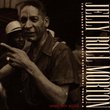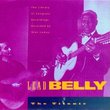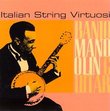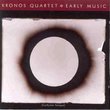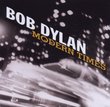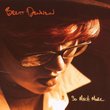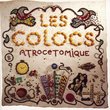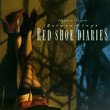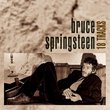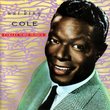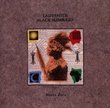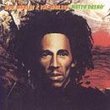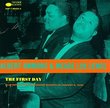| All Artists: Woody Guthrie Title: Library of Congress Recordings Members Wishing: 3 Total Copies: 0 Label: Rounder / Umgd Release Date: 2/14/1992 Genres: Folk, Pop Style: Traditional Folk Number of Discs: 3 SwapaCD Credits: 3 UPCs: 011661104129, 011661104143 |
Search - Woody Guthrie :: Library of Congress Recordings
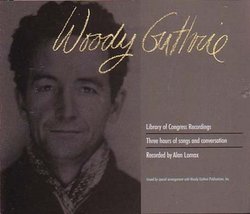 | Woody Guthrie Library of Congress Recordings Genres: Folk, Pop
No Description Available. Genre: Folk Music Media Format: Compact Disk Rating: Release Date: 20-JUN-1989 |
Larger Image |
CD DetailsSynopsis
Product Description No Description Available. Genre: Folk Music Media Format: Compact Disk Rating: Release Date: 20-JUN-1989 Similar CDs
Similarly Requested CDs
|
CD ReviewsFascinating for folk lovers S. Isaacs | Denver, CO | 06/24/1998 (4 out of 5 stars) "It's one thing to hear Woody Guthrie perform his songs. His impromptu style (wherein he delays a few entries while he plays, seemingly because he's forgotten the words for a bit) belies his genius...or maybe even showcases it. Guthrie is one of a handful of musicians who can compose music--and perform it--on a moment's notice. If you're interested in this work, though, understand that the other aspect you get here is some detailed interviewing by folklorist Alan Lomax--which sets this recording apart. I myself stared at the speakers like radio listeners of the '20s and '30s, transfixed, like I was listening to stories told to me from a spiritual grandfather I never had known. His stories are alternately hilarious, wise, painful, and tragic--and utterly fascinating. The recording is not the best. The third CD in particular wavers due to an unevenly played vinyl or wax record, from which this set was recorded. However, the whole set does full justice to an American genius and an underappreciated musician. (Also recommended, if you enjoy these recordings: Bound for Glory, Guthrie's incredible autobiography.)" I would NOT begin with this set M. Goodman | NYC | 10/09/2005 (3 out of 5 stars) "As a historical document, indispensable. Woody's first recordings! As a listening experience, sometimes a little tough going, sometimes even frustrating. Poor micorphone placement compromises clarity of Woody's voice, both speech and singing. Sometimes a bad room echo obscures it even more, Woody doesn't always seem to be next to the microphone. Sound levels not adjusted when he's speaking as opposed to blowing harp and stumming away. Etc. These also are much looser performances than "Dust Bowl Ballads" (his seminal album, recorded a month after this Library Of Congress recording) or the amazing 1944-49 recordings for Mose Asch (the Asch Recordings box set)-Woody is mellow and laid back, frequently blows guitar chord changes to some of his best songs....no big deal! We still love him! But the versions of most songs are better on "Dust Bowl Ballads" (exception: Talkin' Dust Bowl) and especially the Moe Asch recordings (which is what I recommend starting out with). It's great-fascinating-hearing long extended conversations with Woody Guthrie and Alan Lomax (even though it's not exactly loose conversation....it was intended to be broadcast as a radio series) It's conversational.....long and drawling. It's beautiful. Woody suddenly and unexpectedly describing his childhood tragedies is riveting. Three discs of loose version of song, followed by 5 minutes of conversation-sometimes it requires concentrated attention to really get the most out of. Sometimes Alan himself joins in and sings with Woody.....it's that loose. If you've never gotten the Asch Recordings four disc set, that's the one I'd start with, unbelievable. All 4 discs are indispensable. Woody with Cisco Houston is one of musics great rewards, and he's on a lot of that set. Add to that the equally indispensable Dust Bowl Ballads and you have the absolute essential Woody Guthrie. After you've got those two under your belt, then I would pick up these Library of Congress recordings, I place it as number 3. A side note, Woody's harp playing is beautiful, I never see anyone mention that. Also, you can't program out the interviews So each track starts with a song and has up to 6 minutes of conversation. PS-I hope this doesn't sound like a bad review, because it's not! It's an amazing documentary. " Library of Congress Recordings S. Isaacs | 05/02/2000 (5 out of 5 stars) "I have owned these recordings for nearly five years and I have yet to grow tired of hearing Woody speak and sing. While the recordings document his music, they also illuminate a significant moment in American history. Woody Guthrie both witnessed and validated the myth propogated by Steinbeck in "The Grapes of Wrath." Gurthrie's commentary is as rich with red politics as his music; and while he speaks without pretention, his ideas are sophisticated and his deliverery is calculated and genius. I have probably listened to these recordings a hundred times, each time another layer of Woody's mind and era is exposed."
|

 Track Listings (11) - Disc #1
Track Listings (11) - Disc #1